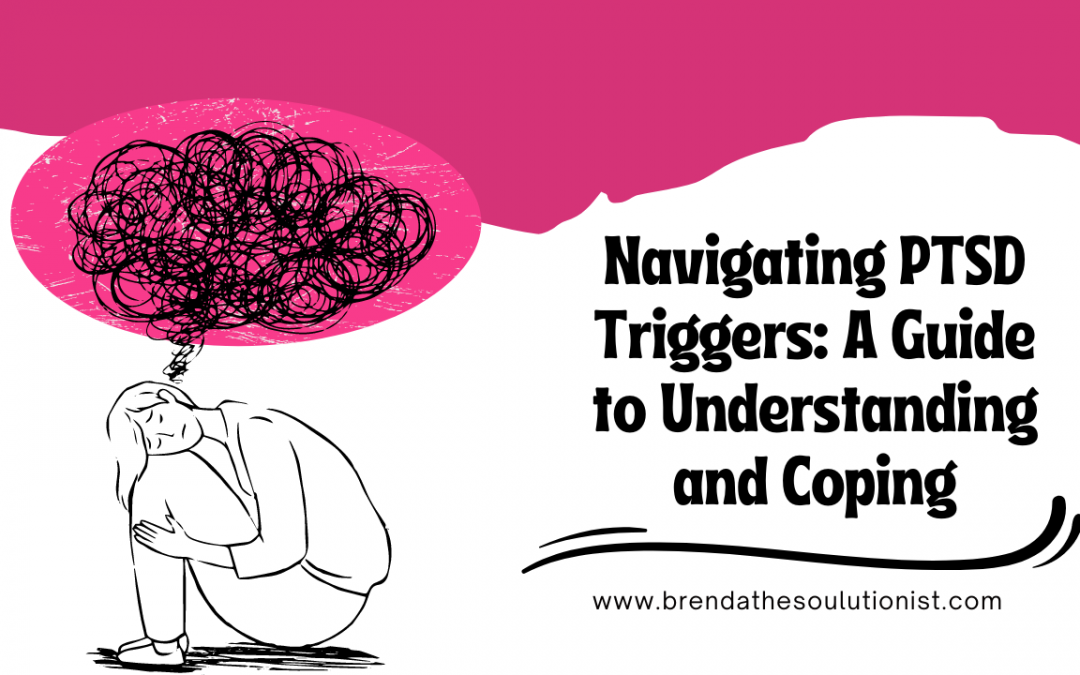
by Brenda The Soulutionist | Jul 8, 2024 | Mental Health, Wellness
Navigating PTSD Triggers: A Guide to Understanding and Coping
Post-Traumatic Stress Disorder (PTSD) is a complex mental health condition that can be triggered by traumatic events, leading to a range of symptoms that impact daily life. The recent 4th of July holiday was a trigger for many. Understanding how to recognize and cope with PTSD triggers is crucial for individuals navigating their healing journey. Let’s explore common triggers, the impact on mental health, and actionable steps to aid in recovery.
Understanding PTSD Triggers:
PTSD triggers are stimuli or reminders that evoke intense emotional or physical reactions linked to past traumatic experiences. For instance, a loud bang might trigger a combat veteran, a certain smell might trigger a sexual assault survivor, or a specific date might trigger a survivor of a natural disaster. Common triggers include sounds, sights, smells, specific locations, anniversaries, or even certain emotions. When triggered, individuals may experience flashbacks, anxiety, panic attacks, nightmares, or hypervigilance.
The Urgent Impact of Triggers on Mental Health:
PTSD triggers can significantly impact mental health, leading to feelings of fear, helplessness, and distress. They can disrupt daily functioning, relationships, and overall well-being, making it challenging for individuals to cope with and manage their symptoms effectively.
Coping Strategies for Recovery:
- Grounding Techniques: Engage your senses by focusing on the present moment, describing objects around you, touching different textures, or listening to calming music.
- Deep Breathing Exercises: Practice diaphragmatic breathing to calm the nervous system and reduce anxiety levels during triggering moments.
- Seeking Therapy: Consult a mental health professional specializing in trauma therapy, such as cognitive behavioral therapy (CBT), EMDR, or exposure therapy, to address triggers and underlying trauma.
- Support Groups: Consider incorporating I-Inspire House On Clubhouse into your weekly self-care routine. I-Inspire House has Strong Love Talks about PTSD every Sunday at 3:00 PM Est. Group support has been shown to reduce stress and promote a sense of well-being. A safe space to talk can support your healing journey and provide comfort.
- Journaling: Express your thoughts and emotions through writing to process triggers, reflect on your experiences, and track your progress in managing symptoms.
- Mindfulness and Meditation: Practice mindfulness exercises to stay grounded in the present moment, cultivate self-awareness, and reduce stress related to triggers.
Supporting Loved Ones with PTSD:
- Listen and Validate: Offer a compassionate ear, validate their feelings, and create a safe space for open communication.
- Educate Yourself: Learn about PTSD, its symptoms, triggers, and treatment options to understand your loved one’s experiences better.
- Encourage Professional Help: Suggest therapy or support groups and assist in finding resources for their mental health needs.
Final Thoughts:
Recovering from PTSD triggers is a journey that requires patience, self-compassion, and a multifaceted approach to healing. By recognizing triggers, implementing coping strategies, seeking therapy, and utilizing supportive tools like I-Inspire House On Clubhouse, individuals can take proactive steps toward managing their symptoms and reclaiming their mental well-being. Remember, healing is a process, and reaching out for help is a courageous step towards resilience and recovery. You are not alone in this journey. # PTSDAwareness #MentalHealthSupport #HealingFromTrauma

by Brenda The Soulutionist | Jun 9, 2024 | Mental Health
Embracing Self-Appreciation While Celebrating Achievements With PTSD
Living with PTSD can present unique challenges, making it crucial for individuals to cultivate a practice of self-appreciation and celebrate their achievements, no matter how small. While the journey may be marked by ups and downs, honoring oneself and maintaining a positive outlook can be transformative in navigating life after trauma. Here are practical tips to empower individuals with PTSD to embrace self-appreciation and acknowledge their progress along the way.
Express Gratitude Daily
Taking a few moments each day to express gratitude for the things that bring joy and comfort can shift your focus toward positivity. Whether writing in a gratitude journal or simply reflecting on moments of appreciation, practicing gratitude can uplift your spirits and foster a sense of contentment amidst challenges.
Prioritize Self-Care Practices
Make self-care a priority, engaging in activities that nourish your mind, body, and soul, such as meditation, yoga, relaxing in nature, or enjoying a soothing bath. This empowers you to recharge and face each day with resilience.
Celebrate Small Wins
Don’t underestimate the power of recognizing and celebrating even the most minor achievements. Whether it’s completing a task, reaching out for support, or practicing mindfulness, honoring these milestones is a validation of your progress and a source of encouragement. No matter how modest, every step forward is a cause for celebration, reminding you of your strength and resilience.
Reframe Negative Self-Talk
Challenge negative self-talk by reframing your thoughts with compassion and understanding. Replace self-criticism with words of encouragement and kindness. Affirm your worth, resilience, and capacity for growth, reshaping your inner narrative towards positivity and self-empowerment.
Seek Professional Support
It’s essential to seek professional help when needed. Therapy, counseling, or support groups like the Inspire House on Clubhouse, which meets every Sunday at 3:00 pm EST, can provide invaluable guidance, tools, and a safe space to navigate the complexities of PTSD. Engaging with mental health professionals and joining support groups equips you with resources to support your healing journey.
Real-Life Inspiration: Consider my story. Despite my struggles with PTSD, I started a daily gratitude journal. By acknowledging three things I was grateful for each day, I noticed a profound shift in my mindset and overall outlook on life, allowing me to find moments of joy and peace amidst my challenges. It also allowed me to create safe spaces for others, and I now train people around the world to live their best lives.
As you embark on self-appreciation and celebrate your achievements, remember that you are worthy of love, respect, and acknowledgment. Each step you take towards honoring yourself is a testament to your strength and resilience. Embrace the journey with compassion, courage, and the belief that you can create a life filled with purpose and meaning. You deserve to celebrate yourself. Today and always. Join the conversations with Pastor Jeff Moffett, myself, and others in the Inspire House every Sunday at 3:00 pm EST. Follow me on clubhouse listed as Brenda The Soulutionist It is a safe place to get support and be inspired. Be Blessed.
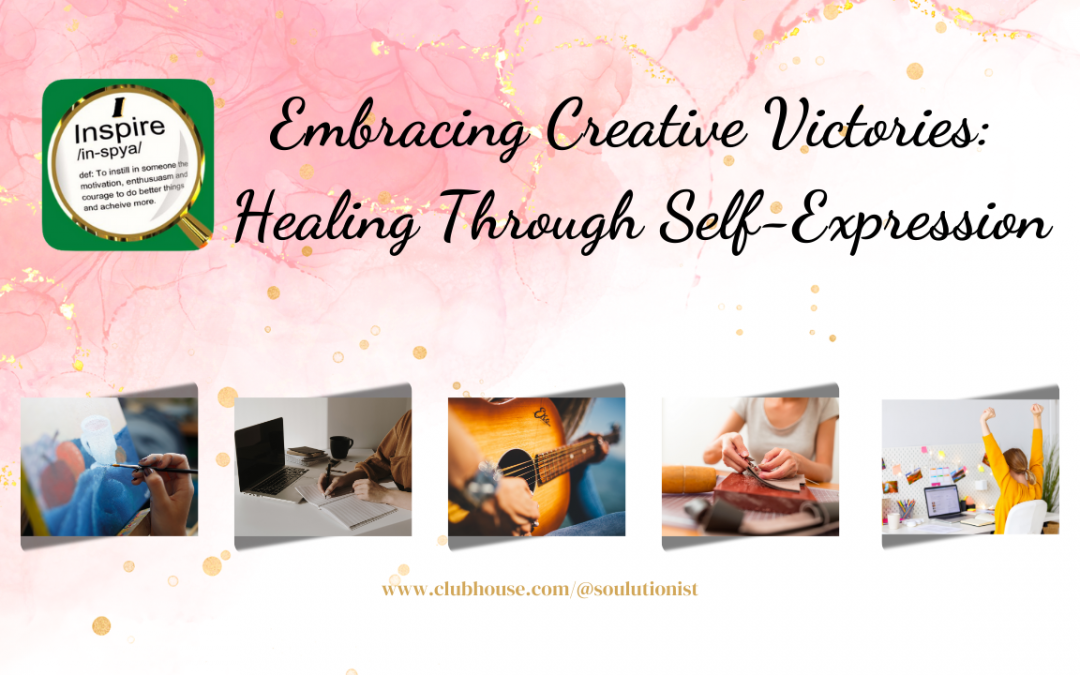
by Brenda The Soulutionist | May 26, 2024 | Mental Health, Veterans
Embracing Creative Victories: Healing Through Self-Expression
Every Sunday at 3:00 p.m. EST, I join the founder of the I-Inspire House, Pastor Jeff Moffett, and others as a moderator on Clubhouse. DISCLAIMER: WE ARE NOT CLINICIANS. We are veterans and fellow travelers on the journey to healing. Our group is open to all interested in a safe place and support. No trauma dumping allowed. Our weekly strong love talks about Post Traumatic Stress Disorder (PTSD) have been instrumental in my own journey to live my best life. Our topics vary, but they always foster a sense of community, a place where you can find understanding and support, encouraging and inspiring our participants and listeners to live fulfilled lives.
In the realm of healing and resilience, creativity serves as a powerful ally in the journey towards overcoming the challenges of PTSD. We have discovered amidst the shadows of isolation and withdrawal that a beacon of light exists that we call Creative Victories. This theme celebrates the transformative power of self-expression, offering a path to connection, growth, and healing within our tight-knit PTSD support group. Here are a few creative expressions we have discussed from time to time you may use to have creative victories in your own life.
Unleashing the Power of Creativity:
Painting Your Story:
One practical way to unleash the power of creativity is through the therapeutic art of painting. This activity allows you to visually express your emotions, memories, or aspirations. Use colors, shapes, and textures to convey your inner world and explore new dimensions of healing through artistic creation.
Writing Your Truth:
Pen down your thoughts, feelings, and experiences in a journal, poetry, or storytelling format. Writing offers a safe space to process emotions, reflect on insights, and give voice to the untold narratives within you. I always say, “The blank page holds no judgment.” If writing by hand is not your thing, grab your nearest digital device to speak or type your truth.
Playing the Melodies of Resilience:
Harness the healing melodies of music by playing an instrument, singing, or listening to uplifting tunes. One of the longest-running houses on Clubhouse is the I-Inspire Melodies to Meditate, Relax and Heal. It operates twenty-four hours a day. Let the rhythm and harmony guide you through moments of introspection, release, and empowerment.
Crafting Your Vision:
Explore the world of DIY crafts, knitting, or sculpting to engage in tactile self-expression. Through the act of crafting, you can create physical manifestations of your inner strength, beauty, and resilience. Each creation is not just a piece of art, but a testament to your personal growth and journey towards healing, a reminder of how far you’ve come and the potential for even more growth and healing. Each step is a victory, a small win that brings you closer to your ultimate goal of healing.
Celebrating Small Wins:
In our support group, every creative endeavor is a victory worth celebrating, no matter how small. Share your artistic pursuits with fellow members, bask in the collective encouragement, and revel in the joy of creative expression. Whether you’re completing a painting, writing a poem, learning a new chord on the guitar, or crafting a handmade gift, every moment of creative triumph is a stepping stone toward healing.
Healing Through Recognition:
As we focus on our Creative Victories, it’s crucial to remember the importance of self-recognition. Take a moment to acknowledge your progress, honor your resilience, and celebrate the steps that lead you on the path to healing, no matter how small. By embracing creativity, sharing our victories, and nurturing self-compassion, we empower ourselves, taking control of our healing journey. We pave the way for profound healing and transformation within ourselves and our community.
Join us in the spirit of Creative Victories as we journey together toward healing, connection, and growth. Let creativity be our guiding light, self-expression our sanctuary, and each small win a testament to the resilience within us. Together, we rise, shine, and celebrate the beauty of healing through the transformative power of creativity. If you’re ready to start your own journey of healing and resilience through creativity, we invite you to share your thoughts and experiences in our next Clubhouse session.
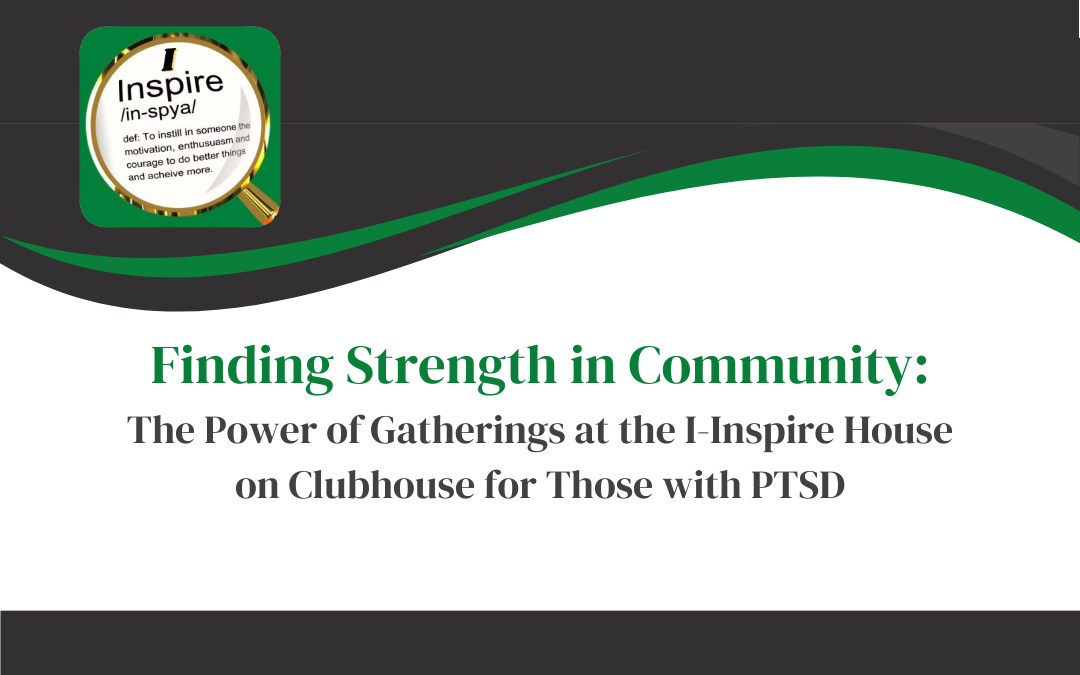
by Brenda The Soulutionist | May 5, 2024 | Mental Health, Veterans
Finding Strength in Community: The Power of Gatherings at the I-Inspire House on Clubhouse for Those with PTSD
Living with PTSD can be a challenging and isolating experience, but finding a supportive community can make all the difference. At the I-Inspire House on Clubhouse, individuals with PTSD have found a safe space to come together. Founded by Pastor Jeff Moffett, PJ, as we are all loving, call him and his crew of moderators (I am one), meet every Sunday at 3:00 p.m. EST to connect, share their stories, and support one another on their journey toward healing. In this blog post, we will explore the power of community when living with PTSD and how gatherings like those at I-Inspire House, where they have Strong Love Talks About PTSD, can provide invaluable support and strength.
- A Sense of Belonging: One of the most powerful aspects of gathering at I-Inspire House is the participants’ sense of belonging. Many individuals with PTSD struggle with feelings of isolation and alienation, but coming together in a group of people who genuinely understand what they are going through can be incredibly validating. Knowing that you are not alone in your struggles and that others share similar experiences can provide a sense of comfort and connection essential for healing.
- Shared Understanding: Another benefit of gathering at I-Inspire House is the shared understanding among participants. Living with PTSD can be challenging to explain to those who have not experienced it themselves. Still, within this community, there is no need to explain or justify feelings and behaviors. Everyone understands each other deeply, creating a space where individuals can be themselves without fear of judgment or misunderstanding.
- Supportive Environment: The gatherings at I-Inspire House provide a supportive environment where individuals can feel safe to express their thoughts and emotions without fear of criticism or rejection. Having a place where you can openly discuss your struggles, fears, and triumphs with others who genuinely care about your well-being can be incredibly empowering. However, trauma dumping is not allowed. This supportive network helps individuals feel validated, heard, and understood in ways that may not be possible in other settings.
- Learning from Each Other: In addition to providing emotional support, gatherings at I-Inspire House also offer opportunities to learn from one another’s experiences. Sharing coping strategies, resources, and insights gained from personal journeys can help individuals navigate their paths toward healing more effectively. By coming together as a community, participants can draw strength from each other’s resilience and wisdom, creating a collective knowledge base that benefits everyone involved.
- Building Resilience: Ultimately, the power of community at I-Inspire House lies in its ability to help individuals build resilience in the face of trauma and adversity. By connecting with others who understand their struggles, sharing their stories openly, receiving support and validation, learning from each other’s experiences, and growing together as a cohesive group, participants are able to cultivate inner strength that helps them navigate life’s challenges more effectively.
Conclusion:
The power of community when living with PTSD cannot be understated. Gathering at places like I-Inspire House on Clubhouse every Sunday at 3:00 p.m. EST provides individuals with a sense of belonging, shared understanding, emotional support, and opportunities for learning from one another’s experiences and ultimately helping them build resilience in the face of trauma and adversity. If you are struggling with PTSD or know someone who is seeking support, consider joining a supportive community like I-Inspire House on Clubhouse. Follow me on Clubhouse and scroll down to join the I-Inspire House, where you can find strength in numbers as you navigate your journey toward healing. Be Blessed
With Gratitude
Brenda The Soulutionist
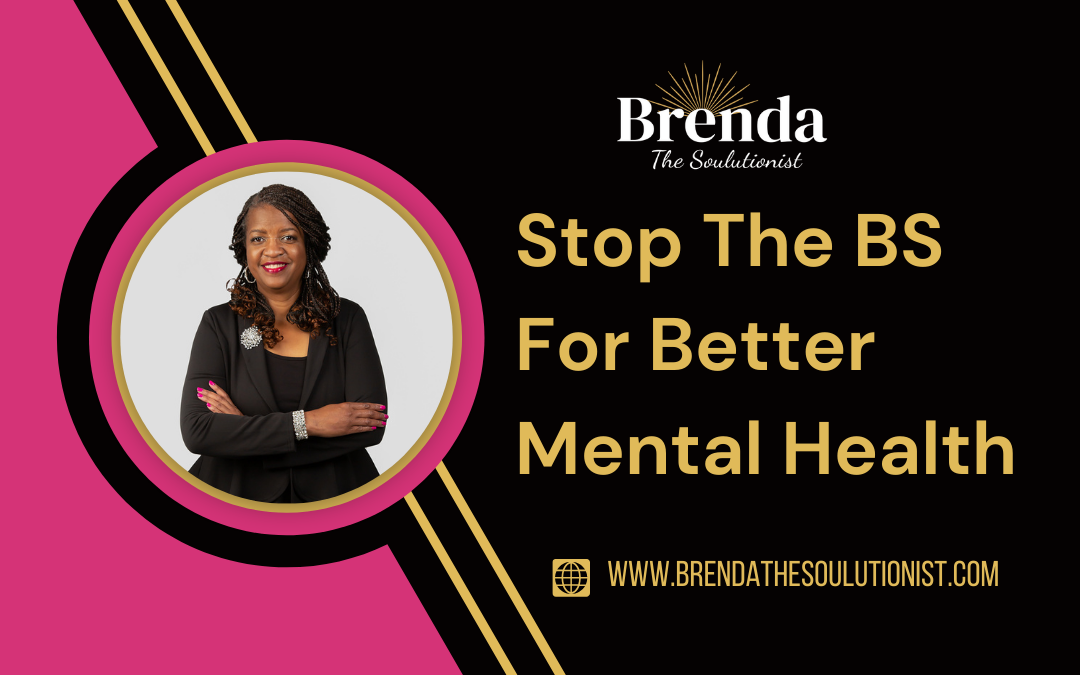
by Brenda The Soulutionist | Apr 10, 2024 | Mental Health
Stop The BS For Better Mental Health
Welcome, entrepreneurs! Today, we’re delving into a pivotal topic for your success and well-being: transforming your Belief System (BS). Your beliefs are the architects of your reality; by reshaping them, you can unlock a realm of boundless potential and achieve your loftiest goals. This journey of self-transformation is not just about mental health. It’s about unleashing the entrepreneur within you, ready to conquer new heights. Let’s delve into how discarding limiting beliefs and embracing empowering ones can lead to enhanced mental health and a trajectory of unstoppable success.
Beliefs Are Not Facts
Let’s kickstart the process of stopping the BS for better mental health by identifying those sneaky limiting beliefs. These are the thoughts or beliefs that hold you back from reaching your full potential. Perhaps you’ve convinced yourself that you’re not good enough, smart enough, or deserving of success. But here’s the thing: beliefs are not facts; they’re just thoughts. The best part is that your thoughts can be changed. By recognizing these negative beliefs, you’re taking the first step towards challenging and replacing them with empowering ones. Affirmations, visualization, and positive self-talk are powerful tools that can help you reprogram your mindset for success.
Get Connected
Next, it’s crucial to immerse yourself in a nurturing environment of positivity and inspiration. This involves seeking out mentors, coaches, or kindred spirits who uplift and bolster you on your journey. By surrounding yourself with a positive support system, you not only fortify empowering beliefs but also become part of a community that shares your vision and supports your growth. Remember, success is not a solitary pursuit; it’s a collaborative endeavor. The Soulutionist Portal is an excellent place for connection.
Self-care For Better Mental Health
Remember, entrepreneurs, that taking care of your physical and mental well-being is not a luxury; it’s a necessity for maintaining a positive mindset. Regular exercise, proper nutrition, mindfulness practices, and adequate rest are not just buzzwords. They are the building blocks of better mental health. When your body feels good, your mind follows suit. Making self-care a priority is not selfish. Self-care is self-preservation. It allows you to show up as the best version of yourself each day, ready to tackle any challenge that comes your way.
Write Your Vision
Moreover, setting clear goals and intentions can help guide your belief system toward success. Write down your aspirations and visualize achieving them daily to take action to close the gap between your desire and reality. When you believe in yourself and your abilities wholeheartedly, there’s no limit to what you can accomplish. Embrace challenges as chances for growth instead of obstacles; this change in viewpoint can be transformative.
Be Grateful
Cultivating a daily practice of gratitude can infuse your mindset with positivity and attract more abundance into your life. Reflect on what you’re grateful for each day. Begin celebrating your significant achievements and small joys, and witness as optimism permeates every facet of your life. Gratitude possesses the extraordinary ability to transmute even the bleakest moments into opportunities for growth and learning. By focusing on the positives in your life rather than the negatives, you’ll discover that success becomes a natural state of being. Gratitude is not just a practice; it’s a beacon of hope that guides you through the darkest times and leads you to the light of success.
Conclusion
Stopping the BS for better mental health requires dedication, self-awareness, and a commitment to growth and is a continuous journey worth taking. Changing your belief system from limiting to empowering beliefs will pave the way for unstoppable success in all areas of your life. Remember that every thought you think shapes your reality. Choose wisely! So go ahead, entrepreneurs; stop the BS today and watch as miracles unfold before your eyes. Need help to change your BS get information and join The Soulutionist Portal group coaching designed to help you close the gaps between your desires and reality.
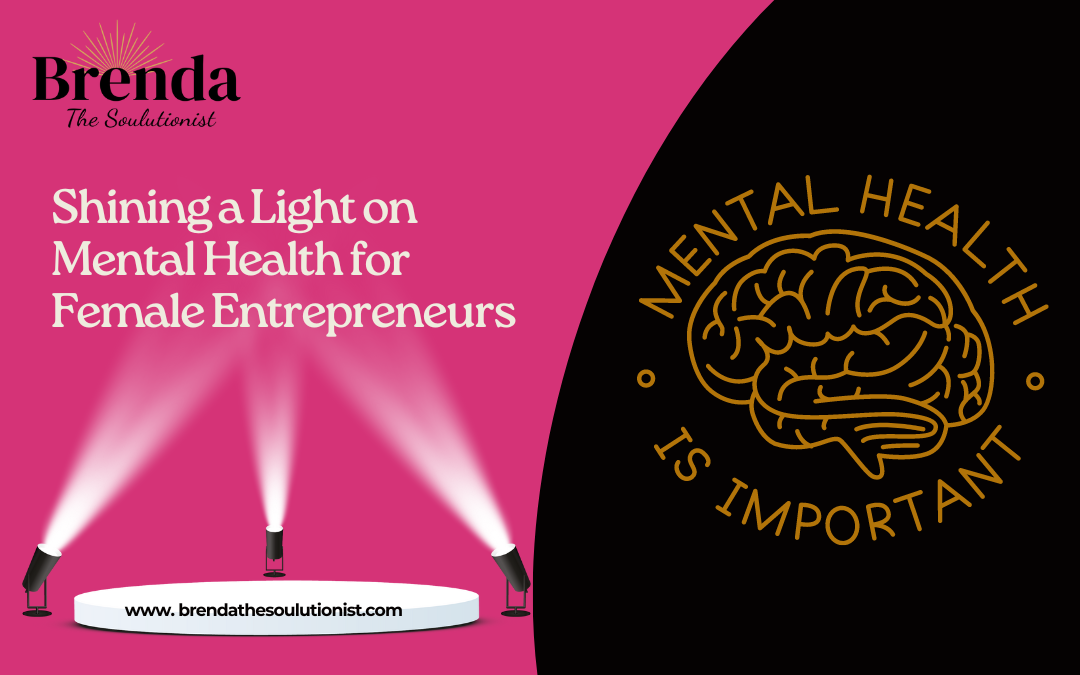
by Brenda The Soulutionist | Mar 22, 2024 | Mental Health
Shining a Light on Mental Health for Female Entrepreneurs
As we celebrate Women’s History Month, it is crucial to highlight and shine a light on the often-overlooked topic of mental health among female entrepreneurs. Behind the facade of determination and success lie the silent struggles faced by many women as they navigate the demanding terrain of entrepreneurship. From battling stress and societal pressures to overcoming the unique challenges associated with running their businesses, female entrepreneurs often find themselves in need of support and understanding. As a self-proclaimed voice for the voiceless, someone who hit rock bottom and almost self-silenced, I want every reader to know you are not alone.
The Unseen Struggles
Behind the scenes of every accomplished female entrepreneur lies a narrative of perseverance against overwhelming odds. The pressure to meet societal expectations, juggle multiple roles, and excel in a fiercely competitive landscape can take a toll on mental well-being. Additionally, the burden of isolation, imposter syndrome, and dreaded work-life balance further compound the challenges female entrepreneurs face.
The Impact of Mental Health on Entrepreneurial Success
The significance of mental health cannot be overstated, especially in the context of entrepreneurship. Research has shown that an entrepreneur’s mental well-being directly influences their ability to perform, innovate, and lead effectively. Shockingly, statistics reveal that a significant number of female entrepreneurs have reported experiencing anxiety, depression, or other mental health conditions, underscoring the urgency of addressing this issue.
Actionable Advice and Resources
Prioritizing mental health is not just a necessity but an investment in sustainable success. Here are some actionable tips and resources tailored to nurture the mental well-being of female entrepreneurs:
- Self-Care Strategies: Encourage regular exercise, mindfulness practices, and adequate rest to recharge both body and mind.
- Seeking Support: Normalize the act of seeking professional help when needed. Therapy, coaching, and mentorship can provide invaluable guidance and support.
- Community and Networking: Foster a supportive network of fellow female entrepreneurs, providing a safe space for open dialogue and shared experiences.
- Mental Health Resources: Highlight available mental health resources, hotlines, and support groups specifically catering to female entrepreneurs.
A Call to Action
In honoring the legacy of all women who have fearlessly blazed trails in entrepreneurship, let us remind ourselves that prioritizing mental health is not a sign of weakness but rather a testament to strength and resilience. By taking proactive steps to care for our mental well-being, we not only empower ourselves but also pave the way for future generations of female entrepreneurs to thrive without sacrificing their mental health.
As we navigate the intricate tapestry of entrepreneurship, let us stand together in advocating for the significance of nurturing mental health among female entrepreneurs. Our journeys are intertwined, and by championing mental well-being, we pave the way for a future where success is synonymous with holistic well-being. The National Crisis Lifeline is open twenty-four hours a day. If you or a loved one is struggling with thoughts of suicide, please dial 988 (Veterans press 1). Make the call to get the help you need. I did, and I am still here. Be blessed.






